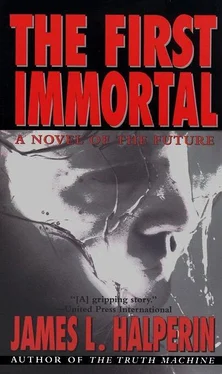“You still don’t remember killing her, do you?”
“Nope. Not one second of it. But I seen the VR tape, so I know I deserve the toxin. Hell, I deserve worse than I’m getting. Don’t you sweat none a this, Mr. Butters. I got a fair trial.”
“I sweat them all, Mr. Cole. It’s a flaw in my character.” Brandon nearly put his arm on Cole’s shoulder. “I’ve learned a lot about you these last few weeks. You did an appalling thing, but you were clearly insane at the time. Six years ago, before Swift and Sure, you’d never have received the death penalty; might’ve even gone to treatment instead of prison. So I guess I’ll sweat yours more than most.”
“I have another request,” Cole said. “I’d like to donate my organs. At least whichever ones you think make sense.”
“I suspected you might. Good for you. Then at least some gain will come of this. What about your brain? Would you like it frozen, too?”
“My brain?”
“Yes. Good thing you called the police so promptly. Since we managed to salvage and freeze your wife’s brain, I have the option to have yours suspended as well, if you’d like. I’m offering you that choice. Of course, you’re also giving us the authority to test experimental revival and criminality-reversal techniques, and if you’re successfully reanimated, I can’t say what status future civilization might give a convicted murderer. No telling how you’d be treated.”
Cole paused just a few seconds. “I reckon I’ll accept your offer. I just hope it’s helpful to you. As for maybe keeping my life, well, that’s a bonus.”
“Good, then.” They shook hands.
“Thanks for coming today,” Cole said. “I know you’re the only D.A. that visits every death-row felon in his county. Must be hard on you, Mr. Butters. I just want you to know I appreciate it.”
“Goodbye, Mr. Cole. Maybe someday you’ll make it back to the world of the living.”
Three P.M., Brandon Butters sat at his desk, across from a certain congenial scoundrel. It was their first meeting since 1992. Patrick Webster, now a semi-retired defense attorney specializing in crimes of the rich and well-connected, practically sang, “They were unarmed, for chrissake! I promise you, Brandon, I’ll take this to trial before I let those boys serve a day in prison, much less plead to a violent felony. Wouldn’t be much of a lawyer if I went for the deal you’re offering.”
Brandon casually evaluated Webster’s attire, the latest in temperature-controlled finery: a $2,700 Ralph Lauren long-sleeve, aeration chemise. A pair of Agnellini cross-breeze slacks which the public servant pegged at four or five grand. Wristband PC/communications module by Patek Phillippe: $26,500, even though Casio and Texas Instruments each made comparable ones for one-tenth the money. And those shoes: the very finest shiatsu-massage loafers from Matsushita. Easily five figures, the D.A. appraised, not impressed, jealous, or even repelled; really just inquisitive.
“What’s your bottom line, Pat?” Brandon asked, contemplating the irony of their de facto 180-degree shift of allegiances over these past two decades: Today he was defending frozen corpses against Webster’s clients.
“They’ll plead to one count of second degree aggravated vandalism; two years’ probation apiece; take it or leave it.”
“These guys broke into the Boston Cryonics Union, thawed six people in suspended animation, irreparably destroyed their brains, and you want probation?”
“They thawed six frozen dead bodies. Not six people. So says the law, which we are sworn to uphold. Jon Hansen and Kevin Lipshitz are political activists, men of conscience, not violent criminals.”
“But they did break the law.”
“I admit,” Webster said, “only that they destroyed private property. To protest the unaccountability of cryonics to the poor.
“Which they most certainly are not, or I’d be dealing with a public defender today.”
“Let’s just say they have friends of some means.”
“Obviously.” Brandon weighed his chances of obtaining more than two years’ probation in litigation: practically zip. Besides, the ridiculous sum they were paying Webster to get their butts out of jeopardy would help deter them from future mischief. “Have you ever considered, Pat, that your clients’ efforts might have been better spent demonstrating against the very laws that are about to save their asses? If those in suspension had rights as potential human beings, there’d be less red tape and litigation, and even the ‘poverty-stricken’ would be able to afford biostasis. Of course then your virtuous, conscience-bound clients wouldn’t be able to assassinate defenseless so-called corpses and get away with it.”
Webster burst out laughing.
It wasn’t funny, the ADA told himself. But then again…
Webster flashed the grin of a man who wanted to be a good sport, within reason. “C’mon, Brandon. Lighten up.”
Brandon smiled. “Okay, I’ll agree to vandalism two, and a restraining order that converts any repeat offense by your clients against cryonic suspendees into a class-two felony.”
“No problem. You won’t see them in here again, I can promise you that.”
“And tell me the truth, Pat, one human being to another, off the record.”
“Okay. Sure.”
“What if one of those brains belonged to someone you knew? What if it was your wife or brother or son?”
“Brandon, you already know I can argue either side.” Webster winked. “Matter of fact, I seem to recall that you can, too.”
June 12, 2015
—Sun Microsystems unveils Brainiac ‘16, an integrated analytical engine which Chairman Scott McNealy says will allow businesses to write most software without human programmers. McNealy predicts that within a decade, future versions of Brainiac will convert simple verbal instructions elicited from questions it asks its owners into errorless software code more efficient than almost any human could write. Industry analysts hail the software as a giant leap toward true artificial intelligence. Predictably, Microsoft’s Melinda French Gates derides the product as “redundant in today’s business environment.”—Americana Healthcare surpasses Columbia as the world’s largest Health Maintenance Organization with 112 million patients enrolled worldwide. Analysts credit the firm’s growth to its state-of-the-art telemedicine programs. Their mobile virtual reality vans allow instant diagnosis, treatment, and even some surgeries in patients’ homes, combining the convenience of house calls with the cost efficiencies of office visits.—Today is the last day most banks will exchange cash for e-credits. Coins and paper money, eliminated as a means of exchange in September 2011, have remained redeemable at banks. After today, however, cash may be turned in at government offices only, with electronic credits issued 15 days later. Outside of numismatic collections, less than $20 billion in post-1934 specie remains in circulation, according to the Treasury Department.
In the age of incomplete memories, there were still defining events one never lost, and even during those decades before the Mnemex discovery, I could always recall one particular afternoon as though it were yesterday. I was nine. There I sat in the gallery next to my sixty-four-year-old grandmother, Rebecca Smith-Crane, proudly watching my father address the United States Senate.
“Try not to get too wound up, Trip,” Grandmother had warned me, although she had to know it was futile. Dad was already considered a pioneer of immortalism, and both my parents had inculcated me with their philosophy and sense of mission.
Getting excused from school had been no problem, especially under these circumstances. I’d been enrolled in a self-directed learning program since age seven, and had remained at least two levels ahead of any other nine-year-old in my school. Besides, I’d finished all of that semester’s courses back in February, and had been studying independently for the previous four months.
Читать дальше












